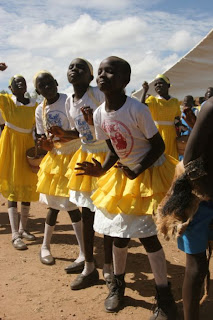Festival of the Acholi Martyrs
It has been almost a month since my last post. I was in a motorcycle accident in northern Uganda, and have been laid up for a bit. (Motorcycles and SUVs are the only ways to get back into the villages.). The roads are dirt, pothole-ridden, and rough. I am fine, though – mostly soft-tissue damage with a couple broken ribs. I will be back on the road soon.
I promised to report on a festival of the Acholi martyrs, who died in the early twentieth century. The festival is indicative of the Acholi spirit in that a sorrowful event is recognized by celebrating the life that continues. In this way, the gathering is as much about celebrating life after the recent war. Also characteristic is that the Acholi draw from whatever traditions are available – in this case both Christian and traditional African – to express both their sorrow and their joy (see photos).
People slept outside on the ground – and I joined them (see photos). I continue to be struck by how the Acholi are knitted together as a people by various bonds of family, clan, and friendship in a way that make hardships into shared experiences and therefore somehow less burdensome. One group of elderly women walked for four days to make it to the festival.
The Acholi work hard, but they also know how to celebrate. People danced late into the night, awoke literally at the crack of dawn on the official day of celebration, and began dancing again (see photos). They wore their best clothes, and somehow – unlike myself – managed to keep them clean. People feasted – slaughtering goats if they had them – and shared what food they had (see photos). Somewhat like a football bowl game, the official activities were only one part of a larger festive gathering where the informal moments are the most salient of all (see photos).











